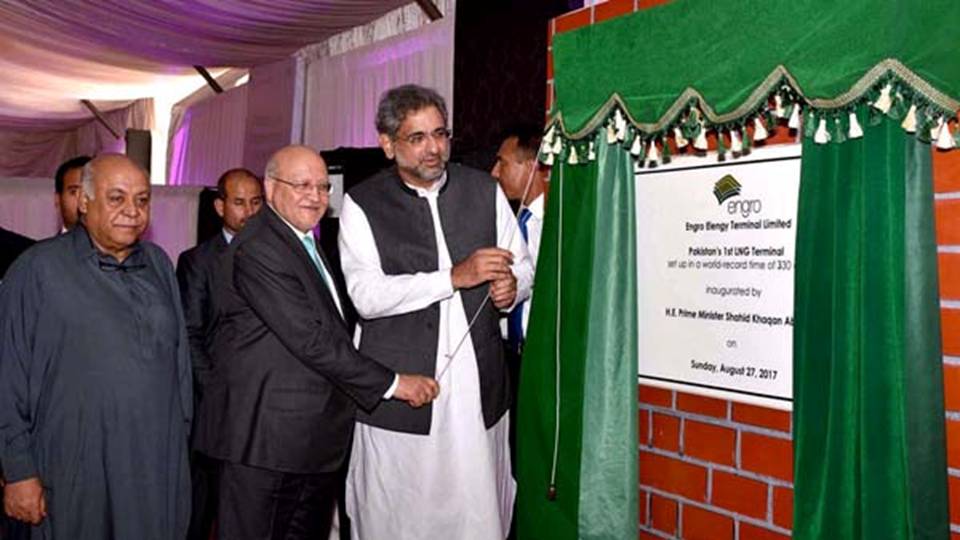ree governments failed to introduce Liquefied Natural Gas (LNG) as a source of energy in the country, while the PML-N government succeeded and that too within a short period of time.
“The PML-N government has brought LNG to the country in a record time of less than 14 months,” premier Abbasi said while inaugurating the first-ever LNG Terminal at the Port Qasim on Sunday.
The terminal has been established by the Engro Terminal Limited with an estimated cost of $300 million within a record time of 330 days and a capacity to re-gasify up to 600 mmcfd of LNG.
The prime minister said that other sources of energy like oil and nuclear were considered expensive as the country required an integrated and efficient source to overcome its crippling energy needs.
The bids for the whole process were completely transparent and the world acknowledged the government’s efforts in this regard, he said, adding that the world was thinking that the project would take several years to complete, but the government succeeded in the shortest time possible.
He said, “No terminal in the world had been completed in such a short time period with full re-gasifying facility.”
About the operational capabilities, the prime minister said the terminal had so far handled 100 cargo ships carrying 6.1 million tons of LNG. It would benefit power, fertiliser, textile and other industries with huge supplies of Re-gasified LNG (RLNG), he added.
He said with a capacity to inject 600 mmscfd RLNG into the system, the Engro LNG Terminal emerged as the single largest gas source in Pakistan.
With the supply of RLNG, the country would save about $1.5 billion each year in fuel savings when compared with other expensive energy resources like diesel or furnace oil, he added.
Abbasi said with the supply of RLNG, the CNG sector has been revived with ample supply of power for the fertiliser industry.
Acknowledging that the completion of the terminal was necessary for supply of energy, the prime minister thanked the authorities concerned for making the task possible.
PGP’s LNG Terminal project
Later, while speaking at another ceremony of Pakistan Gas Port’s LNG Terminal project, the prime minister said that it would be inaugurated in November this year.
He said the government was fixing power crisis in the country and soon load-shedding would “be a thing of the past”, adding that it was all possible due to the huge LNG contribution, referring to the newly inaugurated Engro Terminal.
The prime minister said, “Soon in 2018, the terminals in the country would be able to utilise 9.0 million tons of LNG for the next five years.”
The premier said, “With the LNG market much larger and competition hard, it is a win-win situation for the private sector, government and the people.”
The private sector would be bringing in their own LNG, re-gasifying it as well as delivering it to customers through third party access regime already put in place, he said, adding that through the procedure there would be a system through which customers could purchase LNG on their own.
The prime minister said, “The government will stay out of buying LNG and building terminals as it will be done by the private sector. It [government] will only step in if the private sector fails to meet the demand.”
The government’s vision was to deliver LNG in any quantity to any customer in any part of the country, he added, eyeing complete replacement of furnace-based energy plants by 2019.
The prime minister termed LNG import ‘a game changer for Pakistan’ as 50 per cent primary supply for energy was being made from gas.
Deposed prime minister Nawaz Sharif had decided not to go for groundbreaking of the projects, instead only at the completion of projects, he said, referring to the long-awaited completion of the Lowari Tunnel.
The prime minister said the PML-N government was for completion of projects despite political upheavals.
He said the second LNG project was equity based with no debt, which reflects the confidence of investors.
The prime minister announced that the government had not invested a single penny in the project rather it was up to the private parties. It had only leveraged their demands and ensured transparent bids, he added.
“The investing companies will not get a penny unless they start delivering gas,” he cautioned.

